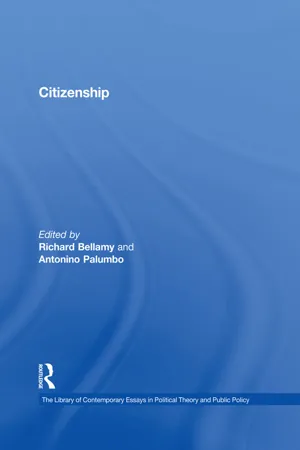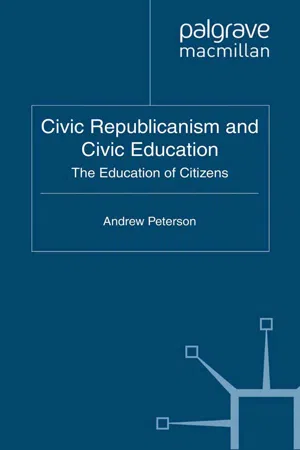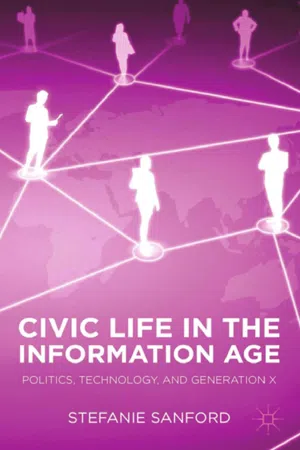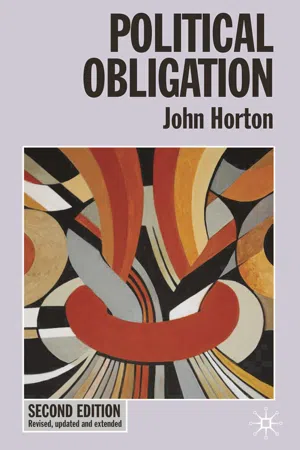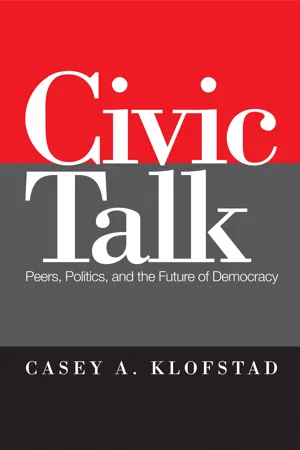Politics & International Relations
Civic Duty
Civic duty refers to the responsibility of citizens to actively participate in the functioning of their community and society. This can include activities such as voting, obeying laws, serving on juries, and engaging in public service. Fulfilling one's civic duty is seen as essential for maintaining a healthy and functioning democratic society.
Written by Perlego with AI-assistance
Related key terms
1 of 5
7 Key excerpts on "Civic Duty"
- eBook - ePub
- Antonino Palumbo, Richard Bellamy(Authors)
- 2017(Publication Date)
- Routledge(Publisher)
What we find in civic republicanism first of all is that citizenship is not a status, but a practice or an activity, which is underpinned by an attitude of mind. It is by acting, by public service of fairly specific kinds, that individuals demonstrate that they are citizens. This public service relates to what it is necessary for citizens to do in order to define, establish, and sustain a political community of fellow-citizens. The community, or the republic, must be defended against those who would threaten it; hence, military service is one of the duties of citizenship. The community must ensure its intergenerational continuity; hence, the rearing of the young in appropriate ways is one of the duties of citizenship. The community must define its other short- and long-term purposes and ends, and act to achieve them; hence, deliberation on these matters, and action to secure them, are among the duties of citizenship. It is action in these spheres which is both constitutive of citizenship, and constitutive and sustaining of the community of which the citizen is a member.Central to civic republicanism is a conception of individuals rather different from that of liberal individualism. First of all, individuals are not thought of as being logically prior to society. They receive their very names in a social context, and as they grow they become aware of, are educated into, and sometimes, perhaps, choose a variety of roles which are socially defined, roles which have duties attached to them, one being that of citizen. Secondly, and consequently, individuals have no sovereign or overriding moral priority. Claims may legitimately be made on their time, their resources, and sometimes even on their lives, for it is only if the community is sustained in being that the practice of citizenship is ensured continuity in time, and the identity of individuals as citizens is preserved. These claims are not part of a contract. They are not obligations which the citizen enters into, to be terminated upon fulfilment. They are duties associated with their very identification of themselves as citizens; not to fulfil them is to cease to be a citizen6 - eBook - PDF
Civic Republicanism and Civic Education
The Education of Citizens
- A. Peterson(Author)
- 2011(Publication Date)
- Palgrave Macmillan(Publisher)
3 Civic Obligation and the Common Good A. Peterson, Civic Republicanism and Civic Education © Andrew Peterson 2011 58 Civic Republicanism and Civic Education Civic obligation Civic obligation is an important term for republicans today, who seek to counter what they perceive as a preoccupation with rights in order to provide a ‘substantive notion of the responsibilities of citizenship’. Indeed, it is civic obligations that ‘provide a bridge between selfish, rights-bearing individuals and their deliberative republican commu- nity’ (Sherry, 1995: 132). Civic obligation broadly comprises the duties expected of a citizen within a particular political community. No clear definition of the precise tasks required by civic obligation exists (indeed these are likely to differ according to the particular political commu- nity), but they can usually be understood to refer to certain civic, social and economic activities. These may include taking part in community life, voting in elections and participating in other democratic processes, being economically active and responsible, obeying the law and main- taining social conventions, as well as engaging in and supporting the institutions of civil society. There has been a great deal of recent inter- est in civic obligation from republican political theorists. 44 Civic repub- lican theorists inextricably link the duties and responsibilities which define civic obligation to conceptions of freedom. It is these concep- tions of freedom – viewed either in terms of self-government or in terms of non-domination – that furnish civic obligation with its republican meanings. For this reason, the basis of civic obligation is conceived dif- ferently within republican theory according to which conception of freedom holds precedence. The first civic republican conception of the basis of civic obligation derives from Aristotelian thought and has clear similarities with com- munitarian ideas. - eBook - PDF
- S. Sanford(Author)
- 2007(Publication Date)
- Palgrave Macmillan(Publisher)
According to their findings, American citizens actually combine these two ethics, participating in community and political activities but participating for mainly individualistic reasons rather than for civic motives. This finding led to the observation that it is pos- sible to have some of the benefits of communitarianism in a basically 24 Civic Life in the Information Age liberal, individualistic polity. This broadest category of citizenship not only encompasses the activities of the more minimal views, but it also adds additional economic and political virtues from Galston’s matrix: the economic virtue of the work ethic and the willingness to engage in public discourse and community involvement. Typical citizens show their citizenship by engaging in the following: ● believe in democratic values; ● trust the legitimacy of the regime; ● vote; ● obey the law; ● are tolerant of other views; ● make few demands on the state; ● are aware of political affairs; ● join/contribute to organizations; ● personally participate in community organizations; and ● participate to some degree in their own governance. Civic Leaders The responsibility of citizens to participate in public affairs—civic virtue—is imbedded in the classical tradition of democratic theory. This conceptualization moves beyond the passive citizen who abides by the law and who ratifies the action of the state and demands intel- lectual activity on the part of citizens (Oliver and Heater, 1994). The classical tradition also emphasizes a sense of obligation not contem- plated by the social model, which focuses on the state’s provision of goods and services. This view features normative constraints on the behavior of citi- zens, imploring them to embrace “civic virtue.” Aristotle and Rousseau, in particular, advanced definitions illustrating these reciprocal obliga- tions. Citizens are those who share in the civic life of ruling and who are being ruled in turn, said Aristotle. - eBook - ePub
Principle of Duty
An Essay on the Foundations of the Civic Order
- David Selbourne(Author)
- 2001(Publication Date)
- University of Notre Dame Press(Publisher)
It is not duty for duty’s sake, being a duty owed by each citizen to live peaceably and sociably in the interests of the well-being of all. In a democratic civic order, such duty is expressed in an obligation to observe laws which are democratically made, impartially administered and enforced, and which are capable of being changed or replaced by democratic means. But in any civic order whatever, it is prima facie the citizen’s obligation to observe and sustain the law, provided that the making, content and administration of such law are not governed by cruel, inhuman, and wicked intent which causes harm to the well-being of some or all of the citizens themselves. It is also the citizen’s general duty to reject ethically, and to resist in practice, recourse to physical violence, whether on the part of fellow-citizens in their disputes with one another, or on the part of the civic order in meting out inordinate punishment to its citizens. However, the duty of the citizen to live peaceably and sociably with his fellow-citizens is decreasingly observed in the corrupted liberal orders, where the rule of the politics and ethics of dutiless right, self-realisation through unimpeded freedom of action and dutiless demand-satisfaction has given always greater practical licence and even (in some minds) ethical legitimacy to the use of violence, including armed violence, in the pursuit of such presumed rights and claims. But the violent negation by the individual of his duty to live peaceably and sociably with his fellows, in the interests of the civic order as a whole, is also a product of the failure of the civic order to fulfil its duties of self-protection and of protection of the individual (including from himself) in the interests of all - eBook - PDF
- John Horton(Author)
- 2017(Publication Date)
- Red Globe Press(Publisher)
It is this relationship – that between people and their political community – with which political obligation is fundamentally concerned. The problem of political obligation is about how this rela-tionship is to be understood and what, if anything, it implies about the responsibilities we have to our political community. In particular, it is 1 about whether we can properly be understood to have some ethical bond with our polity, and if so how this manifests itself. The purpose of this chapter is, thus, to introduce the problem, to sketch some important preliminary distinctions, and to indicate in general terms the concerns of this book. I shall begin, however, by trying to show in a very simple way both the kind of issues involved in political obligation and why they matter. The task of characterizing a more refined and precise under-standing of political obligation will be taken up later in the chapter. Political obligation in context The vast majority of people reading these words will be members of some political entity (today, most commonly, a state), and the lives of all of us who are members of a polity are crucially shaped and structured in a multiplicity of ways by this apparently simple fact. Even the most resolutely unpolitical people have to recognize that the nature of the political community in which they live, what it demands of them and what it permits them, is crucial to their being able to live the lives they do. Where citizens are generally tolerably content with the political arrangements of their society, they may not choose and will not be compelled to think much about their relationship to the political commu-nity of which they are members. Many features of this relationship may be taken for granted, and meeting the requirements that are imposed upon us by it may often be unreflective and habitual: we pay our taxes, apply for a passport if we wish to travel abroad, obey the law, complete our census returns, and much else. - eBook - ePub
Our Underachieving Colleges
A Candid Look at How Much Students Learn and Why They Should Be Learning More - New Edition
- Derek Bok(Author)
- 2009(Publication Date)
- Princeton University Press(Publisher)
not just another option for students to pursue or not as they choose. Virtually all American undergraduates will be eligible to vote, and society has a compelling interest in having them sufficiently informed to do so thoughtfully. It is surely odd to require all students to take courses in the sciences or study a foreign language while taking no steps to ensure that they have enough knowledge to understand the basic problems and processes of their democracy. Many graduates will go through life never using the language they studied in college, and even more will make only occasional use of the scraps of knowledge they recall from their course in introductory chemistry, biology, or physics. But very few will escape the responsibility of being a citizen and having to understand something about the operation of their government and the major recurring issues that every modern democracy confronts.Preparing citizens involves more than imparting relevant knowledge, more even than developing the cognitive qualities required for enlightened political participation. As in building good character, students must not only gain the knowledge and intellectual competence to make enlightened choices, they must develop a sense of responsibility to fulfill the basic obligations of citizenship and participate in civic life. For some undergraduates, such commitments may be forged by serving in student government or by working in a political campaign. Only a few students, however, will enjoy these experiences in the normal course of events. Most will arrive at college affected to some degree by the civic apathy that pervades the population as a whole. Thus colleges need to consider taking affirmative steps to nurture a stronger sense of the responsibilities of citizens in a democracy.There is recent evidence that professors who try to encourage civic participation can increase the interest and commitment of their students in becoming involved with politics and public issues. Investigators examined the results of 21 courses given on a variety of campuses. Although the classes were on different subjects, all included some attempt to stimulate civic engagement. Half of the students in the study were already very interested in politics, but the other half were politically disengaged and took the courses to fulfill a college requirement or for some other extraneous reason. Surveys taken before after the students completed the courses showed that disengaged students became significantly more interested in politics, more committed to involving themselves in politics and civic affairs, and more confident of their political skills. In view of the concerns of some skeptics about the risk of indoctrination, it is interesting to note that participants did not change their political orientation or party allegiance as a result of taking the courses.38 - eBook - PDF
Civic Talk
Peers, Politics, and the Future of Democracy
- Casey Klofstad(Author)
- 2010(Publication Date)
- Temple University Press(Publisher)
Simply stated, civic participation is activity that draws individuals out of their private lives and into civil society. The diagram in Figure 2.1 presents this definition graphically. The left-hand side of the figure repre-sents a simple society, showing government at the top, and each individ-ual’s private life—or the “private sphere”—at the bottom. In between the state and private life we find civil society, or the “public sphere.” Civil society is the space where citizens are able to step out of their private lives and associate with one another. This space is both literal, as in the local town square where citizens congregate, and figurative, as in the rights to assemble and speak freely while you are in the town square. The upward-facing arrow in Figure 2.1 illustrates the ways in which civil society upholds popular sovereignty. The arrow symbolizes the ability of citizens to articulate their views to the government by voting, engag-ing in protests, contacting their legislators, and other such activities. The upward-pointing arrow also symbolizes the fact that participation in pub-lic life gives citizens the means to push back against the government to prevent tyranny. In other words, civil society serves as both a bridge and a barrier between the state and the private sphere (Foley and Edwards 1996; Gellner 1995; Hall 1995). 3 Political Participation (e.g., voting, contacting elected officials, etc. …) Non-Political Participation (e.g., participating in voluntary civic organizations) The State Civil Society Private Life FIGURE 2.1 What is civic participation? 3 It is worth noting that civil society is a necessary, although not sufficient, condition for democracy. For example, civil society was extremely vibrant in the German Weimar Repub-lic. However, because the state was unresponsive to the people during this time period, the
Index pages curate the most relevant extracts from our library of academic textbooks. They’ve been created using an in-house natural language model (NLM), each adding context and meaning to key research topics.
